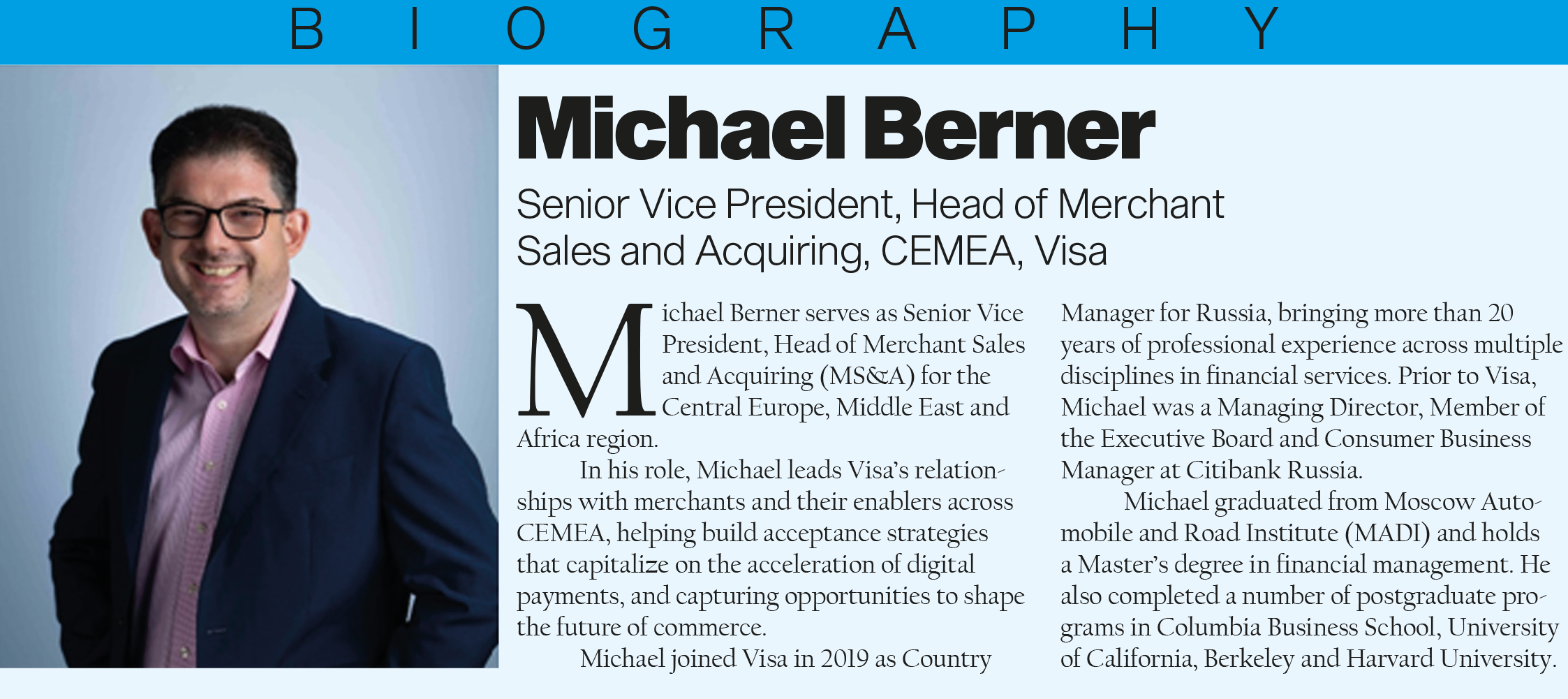Digital payments in Pakistan have made a headway in the last few years. However, the opportunities for more concentrated efforts to increase digital payments are numerous. Global payments services provider Visa is transforming digital payments in Pakistan, as a gateway to financial inclusion within the country. Profit had the opportunity to learn about Visa’s plans for Pakistan from Michael Berner, Senior Vice President, Head of Merchant Sales and Acquiring, CEMEA, Visa.
What role do payment facilitators play in increasing access within the financial ecosystem?
Globally, payment facilitators are driving increased acceptance by empowering eCommerce, small and medium-sized businesses (SMBs), and unique segments not often targeted by banks. They are spearheading the growth of merchants, increasing access to a digital economy, and propelling financial inclusion. We see this realized fully within Pakistan from the radical rise in the number of payment facilitators, tremendous opportunities for growth, and new technologies coming into force. This fully aligns with Visa’s mission – to enable everyone and uplift everyone, everywhere. We want to enable SMBs, a segment that is vital to economic growth.

What is the impact of digital inclusion on individuals and SMBs in driving economic growth?
In many markets including Pakistan, small businesses represent a significant share of the market and are playing a pivotal role in enabling economic growth. Payment inclusion gives SMEs an introduction to new opportunities that were previously unavailable. This includes access to digital payments, strategic advisory on business optimization, and new clients. A classic example is a business with a physical presence that becomes an eCommerce merchant. This opens up access to new information, new markets and cross-border sales.
Is the regulatory environment in Pakistan conducive to growth of digital payments?
Pakistan has taken significant steps to enable its economy, enhance transparency, promote inclusivity, and strengthen the fundamentals for further growth.
The State Bank of Pakistan has demonstrated a commitment to moving in the right direction. We collaborate with regulators globally to enhance transparency in the ecosystem and ensure effective risk management. Our Visa Payfacs program provides acquirers, payment networks, and payment facilitators themselves access to learnings and data, and brings some rules to all participants of the ecosystem which reduce fraud and operational risk. The certification helps payment facilitators grow rapidly and onboard more merchants. The advantage is that banks working with these payment facilitators achieve more transparency and more data.
While the program is supported by regulators, there remains an opportunity for additional efforts in this direction to elevate financial inclusion to the next level.
How crucial is trust and security in digital transactions and services?
Our legacy of ensuring trust and security in digital payments is visible in the progress we have made over a period of 60 years, in 200 countries and territories around the world.
Trust plays a pivotal role, built on factors such as transparency and robust risk management. From a risk management perspective, we are continuously innovating to bring to market new products and solutions that creates a safe and transparent payment infrastructure for everyone including issuers, acquirers, and merchants. Some products that fall in this category are tokenization and the Visa Advance Authorization (VAA) that counter fraud and enable secure transactions.
We are committed to ongoing innovation, introducing new technologies that make the payment ecosystem safer, more secure, and financially inclusive. This not only addresses trust concerns but also contributes to building a more robust payment environment.
Is Visa working with financial institutions to counter the incidence of social engineering scams?
We have observed the rise of social engineering scams around the world. We conduct risk awareness educational sessions, workshops and seminars with payment providers and issuers where we impart information on risk management solutions such as Visa Secure, which is a risk based identification process that eliminates the need for card holders to enter their passwords, tokenization, which is the replacement of a 16-digit card number or PAN or a token which is a lot safer and securer, and getting a lot of big advantages from UI and UX. We also speak about the importance of biometrics. For consumers, we have campaigns such as Visa Stay Secure, which reflects Visa’s commitment to raising awareness, strengthening education, and building confidence to combat social engineering threats. The campaign aims to pave the way for a secure and seamless digital payments experience.
In Pakistan, what unique challenges do you think payment facilitators face?
Pakistan is a very cash intensive economy. Historically, this market is impacted by the lack of financial literacy and education among many players within the ecosystem. Therefore, there is reduced trust towards digital payments, further exacerbated by a lack of infrastructure. But these challenges are not unique to Pakistan we see similar challenges in many parts of the world where we operate. We are trying to bridge the gap by introducing technologies and working with other stakeholders in the ecosystem to increase financial inclusion. This way we build trust and security in digital payments across the ecosystem.
In Pakistan, we see increased usage of smartphones which are the next generation of payment devices. We see 17 million mobile banking users now, 10.3 million internet banking users, 2.4 million e-wallets and 61 million m-wallets which is a very solid number. And this number keeps growing[1].
Smartphones are a very secure way of payment because it is in the consumer’s hand and has all the security elements embedded in biometrics. Over time, this will help to increase security, which should lead to increasing trust and subsequently increase eCommerce with more people transacting digital payments.
While the number of eCommerce merchants is not that high compared to other markets, it is undoubtedly growing at a rapid pace. This will also help Pakistan to have a more transparent digital payments infrastructure.
However, 54 million payment cards issued for a population of 240 million probably is not that high. In developed markets, we see that typically everyone above 14 years of age would have 1.7 or 1.8 cards per person. This is a long way ahead for Pakistan. While this number is growing, we would like to observe the growth of credit cards which would provide a number of advantages for consumers, merchants, and economy. Currently, it is 79% debit cards, 17% social cards and just 4% credit cards.
Credit cards increase spending power, provide more confidence to consumers. This enables the usage of Buy Now, Pay Later products, which Visa is bringing to the market as well. Especially with the BNPL products, which Visa is bringing to the market as well, over time, we believe that the proportion between the debit and credit cards would change. This holds true for digital payments as well.
Are there any other unique opportunities for payment facilitators in Pakistan?
We see that the number of untapped merchants in Pakistan is very high. In CEMEA overall it is 60 million, and only 11 million in the last year were accepting digital payments, few of these would be inactive. The number of active merchants would be even lower. So, there is a very significant opportunity to increase the number of merchants accepting digital payments. And payment facilitators will be playing a very significant role in increasing acceptance, as we have seen in other parts of the world.
We, at Visa, have a strategy to enable payment facilitators and banks that support them to move faster. Our initiatives such as the Payfacs certification program and also a number of conventional arrangements where we are bringing the best of Visa solutions to support payment facilitators in their journey of bringing growth to the economy. This will bring transparency to eCommerce and enable more secure and safe methods to pay.










The VISA ambitious Plan for Pakistan is Good.